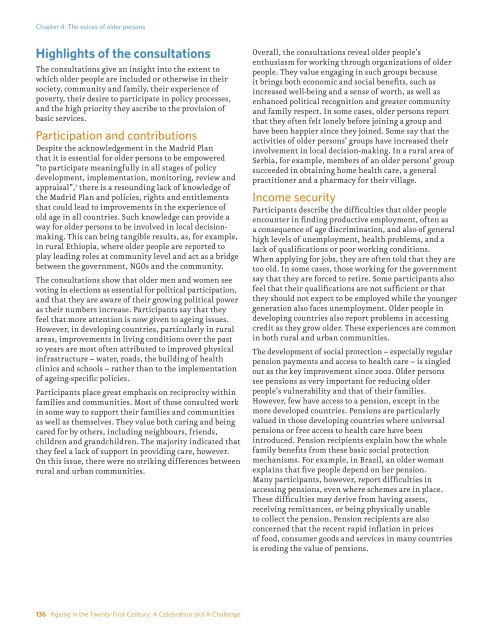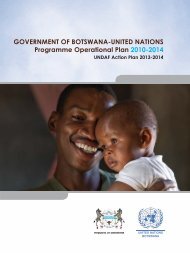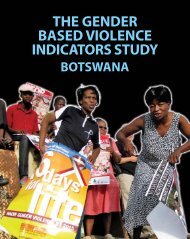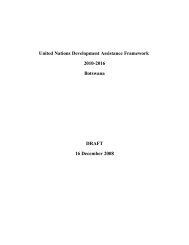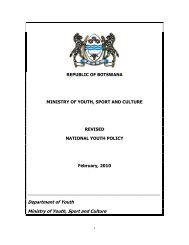Ageing in the Twenty-First Century: - HelpAge International
Ageing in the Twenty-First Century: - HelpAge International
Ageing in the Twenty-First Century: - HelpAge International
You also want an ePaper? Increase the reach of your titles
YUMPU automatically turns print PDFs into web optimized ePapers that Google loves.
Chapter 4: The voices of older persons<br />
Highlights of <strong>the</strong> consultations<br />
The consultations give an <strong>in</strong>sight <strong>in</strong>to <strong>the</strong> extent to<br />
which older people are <strong>in</strong>cluded or o<strong>the</strong>rwise <strong>in</strong> <strong>the</strong>ir<br />
society, community and family, <strong>the</strong>ir experience of<br />
poverty, <strong>the</strong>ir desire to participate <strong>in</strong> policy processes,<br />
and <strong>the</strong> high priority <strong>the</strong>y ascribe to <strong>the</strong> provision of<br />
basic services.<br />
Participation and contributions<br />
Despite <strong>the</strong> acknowledgement <strong>in</strong> <strong>the</strong> Madrid Plan<br />
that it is essential for older persons to be empowered<br />
“to participate mean<strong>in</strong>gfully <strong>in</strong> all stages of policy<br />
development, implementation, monitor<strong>in</strong>g, review and<br />
appraisal”, 7 <strong>the</strong>re is a resound<strong>in</strong>g lack of knowledge of<br />
<strong>the</strong> Madrid Plan and policies, rights and entitlements<br />
that could lead to improvements <strong>in</strong> <strong>the</strong> experience of<br />
old age <strong>in</strong> all countries. Such knowledge can provide a<br />
way for older persons to be <strong>in</strong>volved <strong>in</strong> local decisionmak<strong>in</strong>g.<br />
This can br<strong>in</strong>g tangible results, as, for example,<br />
<strong>in</strong> rural Ethiopia, where older people are reported to<br />
play lead<strong>in</strong>g roles at community level and act as a bridge<br />
between <strong>the</strong> government, NGOs and <strong>the</strong> community.<br />
The consultations show that older men and women see<br />
vot<strong>in</strong>g <strong>in</strong> elections as essential for political participation,<br />
and that <strong>the</strong>y are aware of <strong>the</strong>ir grow<strong>in</strong>g political power<br />
as <strong>the</strong>ir numbers <strong>in</strong>crease. Participants say that <strong>the</strong>y<br />
feel that more attention is now given to age<strong>in</strong>g issues.<br />
However, <strong>in</strong> develop<strong>in</strong>g countries, particularly <strong>in</strong> rural<br />
areas, improvements <strong>in</strong> liv<strong>in</strong>g conditions over <strong>the</strong> past<br />
10 years are most often attributed to improved physical<br />
<strong>in</strong>frastructure – water, roads, <strong>the</strong> build<strong>in</strong>g of health<br />
cl<strong>in</strong>ics and schools – ra<strong>the</strong>r than to <strong>the</strong> implementation<br />
of age<strong>in</strong>g-specific policies.<br />
Participants place great emphasis on reciprocity with<strong>in</strong><br />
families and communities. Most of those consulted work<br />
<strong>in</strong> some way to support <strong>the</strong>ir families and communities<br />
as well as <strong>the</strong>mselves. They value both car<strong>in</strong>g and be<strong>in</strong>g<br />
cared for by o<strong>the</strong>rs, <strong>in</strong>clud<strong>in</strong>g neighbours, friends,<br />
children and grandchildren. The majority <strong>in</strong>dicated that<br />
<strong>the</strong>y feel a lack of support <strong>in</strong> provid<strong>in</strong>g care, however.<br />
On this issue, <strong>the</strong>re were no strik<strong>in</strong>g differences between<br />
rural and urban communities.<br />
Overall, <strong>the</strong> consultations reveal older people’s<br />
enthusiasm for work<strong>in</strong>g through organizations of older<br />
people. They value engag<strong>in</strong>g <strong>in</strong> such groups because<br />
it br<strong>in</strong>gs both economic and social benefits, such as<br />
<strong>in</strong>creased well-be<strong>in</strong>g and a sense of worth, as well as<br />
enhanced political recognition and greater community<br />
and family respect. In some cases, older persons report<br />
that <strong>the</strong>y often felt lonely before jo<strong>in</strong><strong>in</strong>g a group and<br />
have been happier s<strong>in</strong>ce <strong>the</strong>y jo<strong>in</strong>ed. Some say that <strong>the</strong><br />
activities of older persons’ groups have <strong>in</strong>creased <strong>the</strong>ir<br />
<strong>in</strong>volvement <strong>in</strong> local decision-mak<strong>in</strong>g. In a rural area of<br />
Serbia, for example, members of an older persons’ group<br />
succeeded <strong>in</strong> obta<strong>in</strong><strong>in</strong>g home health care, a general<br />
practitioner and a pharmacy for <strong>the</strong>ir village.<br />
Income security<br />
Participants describe <strong>the</strong> difficulties that older people<br />
encounter <strong>in</strong> f<strong>in</strong>d<strong>in</strong>g productive employment, often as<br />
a consequence of age discrim<strong>in</strong>ation, and also of general<br />
high levels of unemployment, health problems, and a<br />
lack of qualifications or poor work<strong>in</strong>g conditions.<br />
When apply<strong>in</strong>g for jobs, <strong>the</strong>y are often told that <strong>the</strong>y are<br />
too old. In some cases, those work<strong>in</strong>g for <strong>the</strong> government<br />
say that <strong>the</strong>y are forced to retire. Some participants also<br />
feel that <strong>the</strong>ir qualifications are not sufficient or that<br />
<strong>the</strong>y should not expect to be employed while <strong>the</strong> younger<br />
generation also faces unemployment. Older people <strong>in</strong><br />
develop<strong>in</strong>g countries also report problems <strong>in</strong> access<strong>in</strong>g<br />
credit as <strong>the</strong>y grow older. These experiences are common<br />
<strong>in</strong> both rural and urban communities.<br />
The development of social protection – especially regular<br />
pension payments and access to health care – is s<strong>in</strong>gled<br />
out as <strong>the</strong> key improvement s<strong>in</strong>ce 2002. Older persons<br />
see pensions as very important for reduc<strong>in</strong>g older<br />
people’s vulnerability and that of <strong>the</strong>ir families.<br />
However, few have access to a pension, except <strong>in</strong> <strong>the</strong><br />
more developed countries. Pensions are particularly<br />
valued <strong>in</strong> those develop<strong>in</strong>g countries where universal<br />
pensions or free access to health care have been<br />
<strong>in</strong>troduced. Pension recipients expla<strong>in</strong> how <strong>the</strong> whole<br />
family benefits from <strong>the</strong>se basic social protection<br />
mechanisms. For example, <strong>in</strong> Brazil, an older woman<br />
expla<strong>in</strong>s that five people depend on her pension.<br />
Many participants, however, report difficulties <strong>in</strong><br />
access<strong>in</strong>g pensions, even where schemes are <strong>in</strong> place.<br />
These difficulties may derive from hav<strong>in</strong>g assets,<br />
receiv<strong>in</strong>g remittances, or be<strong>in</strong>g physically unable<br />
to collect <strong>the</strong> pension. Pension recipients are also<br />
concerned that <strong>the</strong> recent rapid <strong>in</strong>flation <strong>in</strong> prices<br />
of food, consumer goods and services <strong>in</strong> many countries<br />
is erod<strong>in</strong>g <strong>the</strong> value of pensions.<br />
136 <strong>Age<strong>in</strong>g</strong> <strong>in</strong> <strong>the</strong> <strong>Twenty</strong>-<strong>First</strong> <strong>Century</strong>: A Celebration and A Challenge


